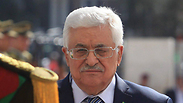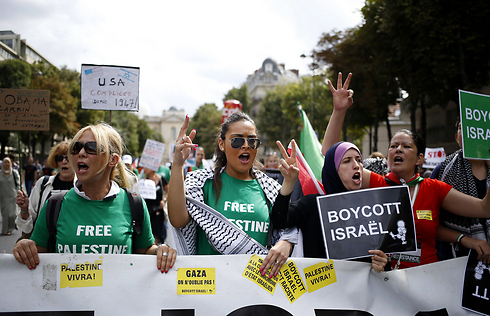
Abbas and the mysterious multi-billion-dollar fund
Palestinian president may be seen by Israel as a weak and irrelevant leader, but he holds a huge amount of power through his control of Palestinian National Fund, which has been financing PLO and PA's battle against Israel's international legitimacy.
That may be true, but the veteran 80-year-old leader holds a huge amount of power in at least one area in the Palestinian arena: He controls the billions of dollars of the National Palestinian Fund, the most important economic body in the Palestinian Authority, whose main activity takes place out of the limelight and whose name has been linked in recent years to outrageous lack of transparency and wide-scale corruption activities.
Abbas is the man who decides where to channel the Palestinian funds in the internal arena - for the welfare of the PA's residents or in favor of other activities.
The Palestinian National Fund is currently financed by donations received from countries, organizations and individuals, as well as by profits from investments in economic projects (companies, lands, etc) around the world and mainly in Arab states. Its exact scope is unclear, but is estimated at tens of billions of dollars. One of the activities the fund finances is the PLO and PA's battle against Israel's international legitimacy.
Although the size of the annual budget for this goal is unknown, it appears to be a pretty high priority. This was reflected in early August, when Taisir Khaled, head of the PLO's expatriate department, greeted released prisoner Khader Adnan in his Ramallah office. Khaled took the opportunity to announce that his department's priority was to "expand the international boycott against the occupation state, prosecute the Israeli war criminals in the International Criminal Court and prevent the Judaization of Jerusalem."
A visit to the elaborate website of the PLO's expatriate department leaves no doubt as to these priorities - regular reports from around the world about boycott initiatives against Israel and additional material presenting Israel in a negative light. In the past week, the PLO even called on the Palestinian communities abroad through the website to organize solidarity rallies with the Palestinian people in light of the situation in Jerusalem.
No budget for organization critical of Abbas
The Palestinian National Fund was founded in 1964 by members of the PLO in order to serve as the body which will manage the Palestinian people's funds. The person who headed the fund was unofficially considered the Palestinian finance minister. The fund's sources of funding were defined as taxes collected from PLO members (about 5 percent of the salaries of PLO members in the Gulf), donations from businesspeople, donations from Arab and other states, from organizations, and more.
Over the years, tens of billions of dollars were transferred to the fund's coffer (it is estimated that some $30 billion passed through the fund's accounts by early 2000). The Arab states' annual financial aid to the PLO reached some $300 million since the mid 1960s.
Over the years, the fund also received different grants in light of the organization's political stance. After the occupation of Kuwait in 1990, for example, Iraqi tyrant Saddam Hussein gave the Palestinian fund a "gift" worth $150 million to thank the PLO for its support of his policy. This is only one example of many.
The Palestinian fund has not only maintained its status since the PA was established after the Oslo Agreements in 1993, but it seems it has also increased its influence. One could say that since the PA's establishment, the Amman-based National Fund has turned into a sort of secret coffer of the two PA chairmen, Yasser Arafat and Mahmoud Abbas. The control of the fund and the billions it manages have given the two leaders huge political power.
Last year it was reported that due to disagreements between Abbas and the PLO Executive Committee's secretary-general, Yasser Abed Rabbi, the Palestinian president decided to take revenge and revoked Abed Rabbo's National Fund-related authorities. Abbas' associates explained that the Executive Committee secretary-general was not responsible for supervising the fund.
Another example of the way Abbas uses the fund's power for his political goals could be seen in the past year, when he reportedly halted the allotments from the National Fund's budgets to the Popular Front for the Liberation of Palestine (PFLP), which is a member of the PLO. He did it after the PFLP criticized him over the security coordination with Israel in the West Bank.
The money in the fund also helps the PLO and Abbas gain support among the Palestinian refugees in neighboring countries. For example, the National Fund transfers millions of dollars a year for medical care for Palestinians in the refugee camps in Lebanon, or grants scholarships to Palestinian students abroad.
15 years without a chairman
According to PLO regulations, the Palestinian National Fund should be run by a special council, and its chairman should be one of the members of the organization's Executive Committee. In practice, however, the fund has not had a chairman for 15 years now, against regulations. About a decade ago, Abbas decided, as the PLO chairman, to appoint Ramzi Khoury, who served as Arafat's bureau chief, as the fund's CEO.
This means that Abbas basically controls the fund's money, and that he knows of and approves the flow of funds to finance anti-Israel activity and propaganda. In order to illustrate where Khoury's loyalty lies, it's enough to mention the fact that he personally showed up at the high school graduation ceremony of Arafat's daughter, Zahwa, in Valletta, Malta.
Since this shadow body generates billions of dollars a year, out of the media's eye, it has become a sought after target among Palestinian politicians. Over the years, the phrase "national fund" has turned into a synonym of corruption on the Palestinian street.
In the early 2000s, the PA was forced to prove to the donor states that was waging an all-out war on corruption. Businessman Jawid al-Ghusayn, who had served as chairman of the National Fund in the past and had no political support, was chosen as the easy prey. The Palestinians claimed that al-Ghusayn had failed to return a $6 million debt to the fund, but al-Ghusayn argued that he had taken the money after receiving Arafat's approval in 1991, in order to invest in a certain business project which had failed.
Al-Ghusayn also revealed that in exchange for his debt, he had given the PLO 45 plots he owned in Jordan. He even threatened to "open his mouth" about senior PLO and PA officials and about the private use they were making of money which should have been used for the Palestinian people's battle, if he were prosecuted.
Al-Ghusayn's daughter, Muna, served as a journalist in highly-circulated newspaper al-Sharq al-Awsat at the time, and senior PA officials feared that negative articles in the paper would expose the corrupt PA officials.
The affair was eventually silenced in order to prevent an embarrassment. PLO and PA officials were relieved when al-Ghusayn died at the age of 79 in 2008, taking many secrets about the corruption of Arafat and his associated with him to the grave. For decades, senior PLO officials had used the Palestinian people's assets as their own. Lands, companies and additional projects funded by the PLO were registered under the names of the organization's senior officials and workers. Khoury made similar comments upon taking office in 2005.
Funding a nose job for ambassador's son
But the National Fund's corruption did not die with al-Ghusayn. On the contrary: The organization, which is also responsible for funding the activities of Palestinian embassies around the world, has turned into the petty cash of the Palestinian diplomats and their family members. In a document posted on social media, for example, Palestinian Ambassador to Ankara Nabil Maarouf asked Khoury to cover the expenses of a his son's nose job, which cost $4,770.
According to another report, shortly after arriving at the Palestinian Embassy in Vienna (from the embassy in Finland), the new ambassador decided to appoint his personal driver as the embassy's financial manager. The cost of this appointment, which was approved by the National Fund, reached about €21,000 (roughly $24,000). The reason for the driver's surprising promotion was the new ambassador's desire to approve irregular personal expenses after the embassy's former financial manager refused to sign on them.
So even if Abbas is politically perceived in Israel as an extremely weak leader, he still has a lot of power in the Palestinian arena, mostly thanks to his control of huge budgets.
Doron Peskin is an expert on Middle Eastern economy.











